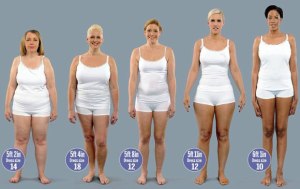A lot of my clients are trying to reach a specific weight goal when they first come in. Basing their goal on their high school weight, what the doctor says (BMI scale) or a mythical number they just came up with.

There is a lot more that goes into finding what a good goal weight is for someone. If we look at body fat, measurements, how someone feels, not just look at the scale. We see higher sanctification, confidence and a more positive outlook on their lives with their results.
Obviously weight is of importance and we don't downplay that, but there is a lot of factors that play in the roll with weight. I had a client that I trained that did not look like she'd need a trainer, was 5'8" weighed in at 135lbs. But when we dug a little deeper to learn about their body and what they exercise routine was, I found their body fat to be at 45%, and they had never lifted weights a day in their life. All they do is cardio to keep their weight off.
This can be a big problem, almost 50% of their weight is fat, the rest is muscle (roughly 10%), organs (roughly 25%), and skeletal structure (roughly 12-15%). That really doesn't leave a lot of muscle and strength on someone's body. We typically want to see 25% in a less active person and up to 45% for a very physically fit person.
Point being, don't base everything on the scale. If you need help finding this out without judgement, come see one of our personal trainers for a free goal setting consultation. We'll help find out what a realistic goal is and one that is attainable.
Fast Food Cheat Sheet

This guide will teach you how to eat fast food and still lose weight at the same time.

